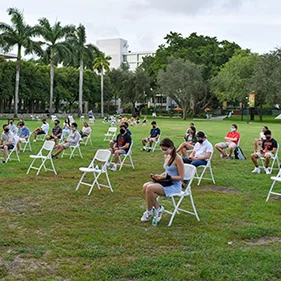Challah, Candles and Six Feet

Candles? Check. Challah? Check. Six feet of distance between chairs? Check.
On Friday nights at college campuses across the country, new routines are meeting cherished traditions. Though just about everything on campus is different this semester as a result of the coronavirus pandemic, some customs haven’t changed: Hillel students gathering as a community to welcome in Shabbat.
Hillels are organizing outdoor Shabbatot to help students connect and perform rituals, while still keeping the health of attendees as the top priority. They’re also making virtual programming accessible for those who choose not to attend in person.
At Syracuse University Hillel, student leaders and staff members are hosting in-person, socially-distanced services and gatherings under a tent in the building’s parking lot.
Despite the awkward distance, freshman political science major Quinn Pierson said she enjoyed having a consistent, warm place to spend Shabbat. Since campus restrictions have made gatherings more scarce, she said it’s been relatively difficult to encounter new people. During Hillel’s Shabbat, however, Pierson, 18, has felt connected to the Hillel community through weekly icebreaker activities like “OYs and Joys,” where students share highs and lows from the previous week.
“To have that place to go where you just feel so welcomed was amazing, especially in a time like this where it’s really hard to meet people,” Pierson said. “Having Hillel has been just really meaningful to me.”
In New York, where social distancing restrictions jump from 6 feet to 12 feet when singing is involved, student leaders like Sam Aaronson, co-social vice president of Syracuse Hillel, have created non-traditional services focusing on movement, writing reflections and coloring.
Though different, Aaronson, 20, says the less formal, low-pressure environment has been an asset to engaging students who prefer shorter and more interactive services. (Traditional services are still being offered virtually.)
“Shabbat is a really big place to make connections, especially when first years come,” said Aaronson, a political science and public relations major. “It’s a good place to bring people if they want to get involved, especially now that it’s a lower-barrier situation — you don’t have to sit through a 45-minute service.”
“It’s unlike any other Shabbat I’ve been to,” Pierson said. “It’s pretty lighthearted at the moment because we’re all figuring it out together.”
There’s a similar camaraderie at the University of Rochester Hillel, where students schmooze while participating in rituals like candle lighting, kiddush and motzi around a tent near the building.
“The pop-up Shabbat is only scheduled for half an hour, but people are always hanging out there after the staff closes down the tent,” said Benjamin Schiffman, a sophomore political science and bioethics major. “It’s just so nice to see everyone.”
With face coverings required, name tags have been an asset to making connections, Schiffman, 19, said. He added that the student leaders and staff have “set the tone” and are working to improve the gathering week to week.
When the gathering was held in front of the first-year dorms, 54 students participated. “All the first years walked by,” Schiffman said. “And a number joined in.”
Sophomore Elise Gendrich, a holiday and ritual engagement intern at Hillel, said having the structured time to socialize with peers is more valuable than ever.
“It’s easier than scheduling a call, because it’s not so formal,” said Gendrich, a 19-year-old chemistry major. “Come hang out, come as you are.”
University of Miami Hillel is offering socially-distant services outside and meals to go. Senior health science major Sabrina Ginsburg, 21, said she applauds the staff for their leadership in being one of the first campus organizations to put on an in-person event. With services being held in the center of campus, the gathering has caught the attention of other students passing by.
“Hillel was a leader in putting on events like this and showing how we can do it at a safe distance,” Ginsburg said. “A few friends have asked about what’s going on because it’s one of the few big events.”
There’s a sense of calmness and peace participating in services as the sun sets, Ginsburg said, citing similarities to her summer camp experiences. Student leaders and staff have worked to create an intimate environment, she said, one that isn’t always present with large events.
To limit the amount of surface contact, attendees use a QR code to access the prayer book virtually on their mobile device from their seat.
“I have personally loved the switch up to outdoor services,” Ginsburg said, describing the serenity of Miami weather at sunset. “Hillel is doing such an incredible job at making this new normal work.”
As other Hillels plan in-person Shabbatot, Syracuse University freshman history major Peter Stein, 18, says to embrace the fact that everything is different.
“Now is a great time for Hillels to try new things,” Stein said. “We’re already out of our comfort zones, might as well lean into it.”
Andrew Rowan is part of the inaugural Hillel International Writers Program, a five-month opportunity for Jewish undergraduate students interested in journalism.